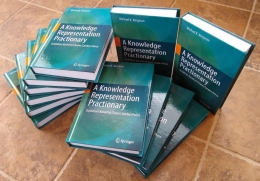Downloads of AKRP Book Chapters
 These book chapters from A Knowledge Representation Practionary are drafts from prior to submission for publication. They do not contain the subsequent edits made for the published version. If quoting or citing, please use the proper citation of the published version and check it for accuracy and pagination.
These book chapters from A Knowledge Representation Practionary are drafts from prior to submission for publication. They do not contain the subsequent edits made for the published version. If quoting or citing, please use the proper citation of the published version and check it for accuracy and pagination.
The proper citation for the book is:
Bergman, M. K. A Knowledge Representation Practionary: Guidelines Based on Charles Sanders Peirce (Springer International Publishing, 2018), 486 pp. doi:10.1007/978-3-319-98092-8
Official site: https://link.springer.com/book/10.1007/978-3-319-98092-8
Here are the author’s final version of chapters and sections available for download:
| Preface | Download | |
| 1. Introduction | Download | |
| Structure of the Book | ||
| Overview of Contents | ||
| Key Themes | ||
| 2. Information, Knowledge, Representation | Download | |
| What is Information? | ||
| What is Knowledge? | ||
| What is Representation? | ||
| Part I: Knowledge Representation in Context | ||
| 3. The Situation | Download | |
| Information and Economic Wealth | ||
| Untapped Information Assets | ||
| Impediments to Information Sharing | ||
| 4. The Opportunity | Download | |
| KM and A Spectrum of Applications | ||
| Data Interoperability | ||
| Knowledge-based Artificial Intelligence | ||
| 5. The Precepts | Download | |
| Equal Class Data Citizens | ||
| Addressing Semantic Heterogeneity | ||
| Carving Nature at the Joints | ||
| Part II: A Grammar for Knowledge Representation | ||
| 6. The Universal Categories | Download | |
| A Foundational Mindset | ||
| Firstness, Secondness, Thirdness | ||
| The Lens of the Universal Categories | ||
| 7. A KR Terminology | Download | |
| Things of the World | ||
| Hierarchies in Knowledge Representation | ||
| A Three-Relations Model | ||
| 8. KR Vocabulary and Languages | Download | |
| Logical Considerations | ||
| Pragmatic Model and Language Choices | ||
| The KBpedia Vocabulary | ||
| Part III: Components of Knowledge Representation | ||
| 9. Keeping the Design Open | Download | |
| The Context of Openness | ||
| Information Management Concepts | ||
| Taming a Bestiary of Data Structs | ||
| 10. Modular, Expandable Typologies | Download | |
| Types as Organizing Constructs | ||
| A Flexible Typology Design | ||
| KBpedia’s Typologies | ||
| 11. Knowledge Graphs and Bases | Download | |
| Graphs and Connectivity | ||
| Upper, Domain and Administrative Ontologies | ||
| KBpedia’s Knowledge Bases | ||
| Part IV: Building KR Systems | ||
| 12. Platforms and Knowledge Management | Download | |
| Uses and Work Splits | ||
| Platform Considerations | ||
| A Web-oriented Architecture | ||
| 13. Building Out The System | Download | |
| Tailoring for Domain Uses | ||
| Mapping Schema and Knowledge Bases | ||
| ‘Pay as You Benefit’ | ||
| 14. Testing and Best Practices | Download | |
| A Primer on Knowledge Statistics | ||
| Builds and Testing | ||
| Some Best Practices | ||
| Part V: Practical Potentials and Outcomes | ||
| 15. Potential Uses in Breadth | Download | |
| Near-term Potentials | ||
| Logic and Representation | ||
| Potential Methods and Applications | ||
| 16. Potential Uses in Depth | Download | |
| Workflows and BPM | ||
| Semantic Parsing | ||
| Cognitive Robotics and Agents | ||
| 17. Conclusion | Download | |
| The Sign and Information Theoretics | ||
| Peirce: The Philosopher of KR | ||
| Reasons to Question Premises | ||
| Appendix A: Perspectives on Peirce | Download | |
| Appendix B: The KBpedia Resource | Download | |
| Appendix C: KBpedia Feature Possibilities | Download | |
| Glossary | Download | |
| Index | ||




